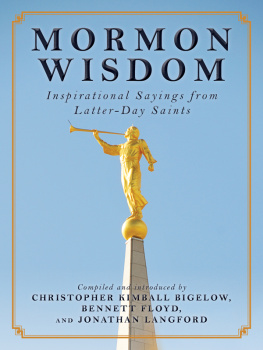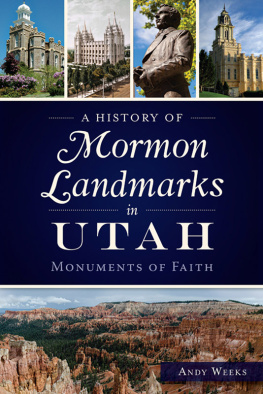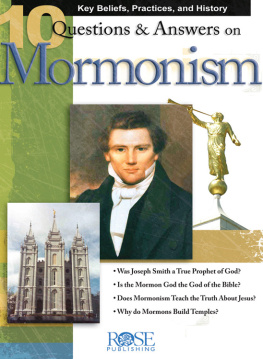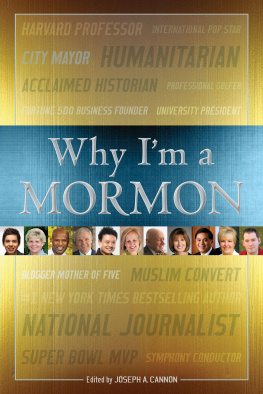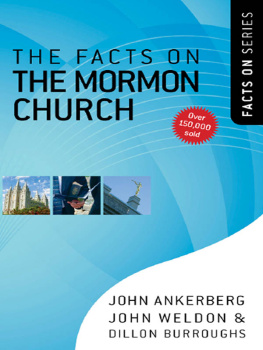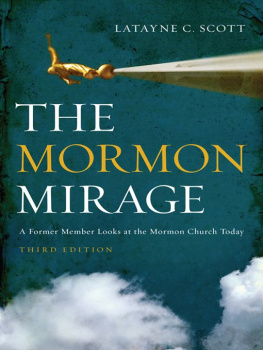This work is not an official publication of The Church of Jesus Christ of Latter-day Saints (LDS) and has not been reviewed, approved, or authorized by the LDS Church. The views expressed within this work are the sole responsibility of the authors and of those quoted and do not necessarily reflect the position of the LDS Church.
Copyright 2015 by Skyhorse Publishing
All rights reserved. No part of this book may be reproduced in any manner without the express written consent of the publisher, except in the case of brief excerpts in critical reviews or articles. All inquiries should be addressed to Skyhorse Publishing, 307 West 36th Street, 11th Floor, New York, NY 10018.
Skyhorse Publishing books may be purchased in bulk at special discounts for sales promotion, corporate gifts, fund-raising, or educational purposes. Special editions can also be created to specifications. For details, contact the Special Sales Department, Skyhorse Publishing, 307 West 36th Street, 11th Floor, New York, NY 10018 or .
Skyhorse and Skyhorse Publishing are registered trademarks of Skyhorse Publishing, Inc., a Delaware corporation.
Visit our website at www.skyhorsepublishing.com.
10 9 8 7 6 5 4 3 2 1
Library of Congress Cataloging-in-Publication Data is available on file.
Cover design by Brian Peterson
Cover photo credit: Thinkstock
Print ISBN: 978-1-63220-635-0
Ebook ISBN: 978-1-63220-791-3
Printed in China.
Contents

Its hard to imagine Mexican or Italian food without tomatoes. What would traditional, homemade spaghetti be without a rich marinara sauce? Or a plate of warm nachos without some tangy pico de gallo? As versatile as the tomato may be, however, it has its limitations. Ask a child to bite into a ripe tomato, and her face will not likely register pleasure. As British journalist Miles Kington noted, Knowledge consists of knowing that a tomato is a fruit, and wisdom consists of not putting it in a fruit salad.
The reality of life is that at some point or other, we all face our share of sweet and bitter timessome of us more than our fair share. Since its humble beginnings in 1830, Mormonism has seen its share of trials and opposition. Today, however, Mormons seem to have largely found their places in society, and the faith has taken its place among some of the worlds most influential religions. Over time, Mormons have learned some valuable, distinctive lessons about the human experience, from how to maximize physical health to how to enjoy successful marriages and families.
WISDOM FROM THE MORMONS
This book collects wise sayings by a variety of Mormons, from Lucy Mack Smith, mother of founding prophet Joseph Smith, to leaders who only recently departed from this life. We chose not to include quotes from living people in order to avoid stepping on anyones toes. This book is not an official LDS Church publication, and not all quotes reflect official Church doctrine. At the end of this volume, weve included brief bios on all those quoted. We would have liked to find more quotes by female LDS leaders.
Also included are quotations from Mormonisms unique scriptures, including the Book of Mormon, the Doctrine & Covenants, and the Pearl of Great Price. As Christians, Mormons uphold the Bible as an equally sacred, vital scripture. For this book, however, weve opted to leave out Bible passages that are no doubt already familiar to most readers. Although other religious groups exist with ties to historical Mormonism, this book focuses on wisdom from members of the largest Mormon faith, the Utah-based Church of Jesus Christ of Latter-day Saints (LDS).
Many of the people quoted in this book are past prophets, apostles, and other leaders of the LDS Church. Perhaps one of the Churchs most unique features is its lack of professional clergy, even at the highest levels of leadership. While these men and women gained much experience during their lives in leading and inspiring the Church, most also pursued secular careers before serving in the Church full time, working in fields such as farming, business, teaching, politics, and many others. Nearly all of them married and had children. The wisdom collected in this volume was born not only of yearnings to understand the divine, but also of practical, earthly experience.
WE SEEK AFTER THESE THINGS
Mormons do not claim a monopoly on truth. One of the basic tenets of Mormon belief affirms, If there is anything virtuous, lovely, or of good report, or praiseworthy, we seek after these things. Goodness, virtue, and edification can be found almost anywhere, if one is willing to search for it. Former Church president Gordon B. Hinckley (19102008) said to members in Nairobi, Kenya, We appreciate the truth in all churches and the good which they do. We say to the people, in effect, you bring with you all the good that you have, and then let us see if we can add to it.
Mormonism provides unique insights on where we came from, why were here, and where were going. Whether one is a lifelong Mormon, a convert to Mormonism, a member of another faith, or not a participant in organized religion, its our hope that the gems of wisdom collected in this volume may provide food for thoughtand maybe a smile or two.
Like members of other faiths, Mormons are continually striving to understand our true identities as children of God, be faithful to Gods teachings, and serve God and our fellow brothers and sisters. Not unlike a good cookbook that tells you when and how to include tomatoes in your dish, we trust that this collection of Mormon wisdom will inform, inspire, and elevate your life and the lives of those around you.

Where do we come from? The answer to this question has been hotly debated by some of the worlds greatest philosophers, scientists, and thinkers. Many religions, particularly Abrahamic faiths, teach that God is our father, a loving, all-powerful, and all-knowing being who created us and placed us on Earth for a specific purpose. These faiths generally share the understanding that life, for humans, begins at birth.
However, Mormonism claims a unique perspective among its religious peers. Like members of other churches, Latter-day Saints believe that God is the spiritual father of humankind. They commonly refer to him as Heavenly Father, addressing him as such during prayer. Unlike other faiths, Mormon doctrine teaches that everyoneMormon and non-Mormon alikelived with Heavenly Father before earthly birth, a period of time commonly referred to by Mormons as premortality or the premortal life.
In addition, Latter-day Saints are taught that God is not a single parent. We not only have a father in heaven, but also a mother. For cultural reasons, Mormons rarely mention Heavenly Mother, but the understanding that each of us has a divine parentage can profoundly shape our view of life and its purpose (see ).

In the premortal realm, spirit sons and daughters knew and worshipped God as their Eternal Father and accepted his plan by which his children could obtain a physical body and gain earthly experience to progress toward perfection and ultimately realize their divine destiny as heirs of eternal life.

